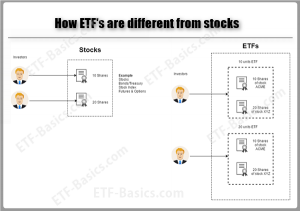An exchange traded fund has some unique characteristic features over stocks and mutual funds. There is no doubt that when it comes to investment choices, investors tend to prefer mutual funds. However, this trend has been changing of late.
Interestingly not many people know about ETF’s, which is one of the major reasons why growth is expected to continue and (partly why mutual funds continue to remain the go-to investment vehicle for beginners).

How ETFs are different from trading stocks
There are some short comings with ETF investments as well. However, it is the pros of ETF investing that makes it so popular. Here are some of the main reasons why ETF investing is growing more popular by the day.
Short selling and trading on margin
An ETF can be bought or sold (short-selling) at anytime during the trading hours. Depending on the liquidity, the value of the ETF can fluctuate, just like a stock’s price. Therefore, it is entirely possible for you to buy an ETF that was trading at $50 at 09:30 and sell it for $55 by 11:00 on the same day.
The concept of short-selling ETF’s is a major argument in favor of ETF’s because this is not possible with stocks. Furthermore, ETFs can be traded on margin unlike stocks making them a favorite, for those who know about exchange traded funds.
On the same note exchange traded funds are a lot more transparent, compared to investing in mutual funds and definitely a lot cheaper than the investing in mutual funds.
Access exotic trading opportunities via ETFs
Investors and traders flock to exchange traded funds because it allows them to track or trade in ETF’s that have exposure to a certain asset or security that would have been usually out of reach. For examples, investors in the U.S. can simply pick one of the many emerging market ETF’s for example if they want to trade or invest in a foreign stock index.
An example would be the ETFs from WisdomTree, an ETF provider that offers exotic ETFs such as the WisdomTree emerging markets dividend fund (NYSE:DVEM) or the WisdomTree India Earnings (NYSE:EPI).
Closer to home, ETFs allow investors to track a specific investment goal. For example one would prefer to invest in the SPDR S&P 500 ETF (NYSE:SPY) which allows them to track the returns from the S&P 500 U.S benchmark stock index.
Other investors who want exposure to the real estate or biotech stocks will find investing in a REIT ETF or a Bio Tech ETF an easier and cheaper alternative than to pick the stocks individually.
Cost implications of ETFs over stocks
Then there is of course the cost implication for all. For example, it is cheaper to buy ETF’s that track ten stocks rather than allocate capital and purchase ten stocks. Not only does managing these stocks become cumbersome, there are also costs that come with it.
With that said, buying and selling ETFs also have some drawbacks especially when it comes to costs. In the next article we take a closer look at the costs associated with trading in Exchange traded funds and also understand the various fee structures that one should know before ETF investing.
